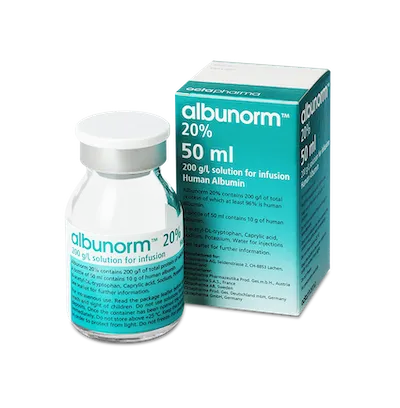Description
Albunorm 20% Solution for Infusions 50 ml. №1 Vial
Ingredients:
Albunorm 20% solution contains human albumin as the active ingredient. It is a sterile, non-pyrogenic solution obtained from human plasma.
Mechanism of Action:
Albunorm 20% solution works by increasing plasma volume and improving oncotic pressure in the blood vessels, which helps to maintain adequate tissue perfusion. This pharmacological action is crucial in conditions where there is a loss of intravascular volume, such as in septic shock or major surgeries.
Pharmacological Properties:
The solution improves oncotic pressure and helps in maintaining proper tissue perfusion by increasing plasma volume.
Indications for Use:
Albunorm 20% solution is indicated for the restoration and maintenance of circulating blood volume where volume deficiency has been demonstrated.
Contraindications:
Do not use Albunorm 20% solution if the patient has a history of hypersensitivity to albumin or any component of the formulation. It is contraindicated in patients with severe anemia and heart failure.
Side Effects:
Common side effects may include allergic reactions, fever, and fluid overload. Monitoring for signs of fluid overload is essential during administration.
Usage Instructions:
The dosage of Albunorm 20% solution is determined by the healthcare provider based on the patient’s condition, weight, and medical history. It is administered intravenously and should be given slowly to prevent adverse reactions.
Follow the healthcare provider’s instructions carefully when using Albunorm 20% solution. The solution should be inspected visually for particulate matter and discoloration before administration.
Benefits Compared to Analogues:
Albunorm 20% solution has shown effectiveness in treating hypovolemia and improving hemodynamic stability in critically ill patients. Clinical studies have indicated its superiority over crystalloid solutions in certain patient populations.
Suitable Patient Groups:
Albunorm 20% solution is suitable for adult patients requiring volume resuscitation and maintenance therapy. Dosage adjustments may be necessary for pediatric and elderly patients based on individual factors.
Storage Conditions and Shelf Life:
Albunorm 20% solution should be stored at controlled room temperature and protected from light. It is essential to monitor the patient for signs of fluid overload during administration.
Packaging Description:
The product comes in a 50 ml vial for infusion containing Albunorm 20% solution.
Clinical Evidence and Proven Effectiveness:
Studies have shown that Albunorm 20% solution is effective in treating hypovolemia and improving hemodynamic stability in critically ill patients. Research published in the Journal of Intensive Care supports the use of albumin solutions for volume resuscitation in sepsis.
Clinical trials have demonstrated the comparative effectiveness of Albunorm 20% solution against crystalloid solutions in critically ill patients. A meta-analysis published in Critical Care Medicine showed that albumin solutions were associated with a lower risk of mortality compared to crystalloids in certain patient populations.



